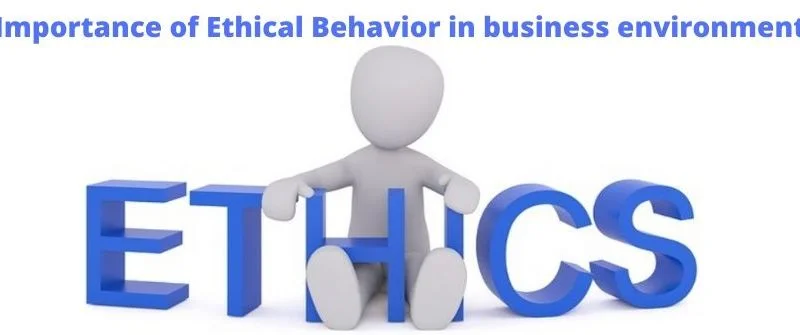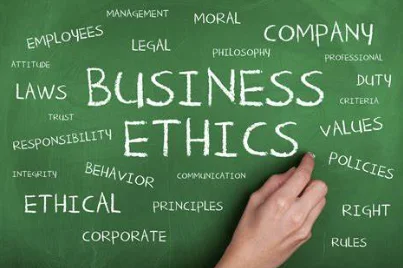Importance of Ethical Behavior and Business Ethics

Ethical behavior in the corporate environment and management is the practice of acting in acceptable ways that are consistent with the best values of society. The values of society and the environment’s expectations towards business organizations create a need for a company to act ethically.
Embracing ethical behavior is, therefore, necessary for balancing a corporate image in society (Ferrell et al., 2014). While the business cannot separate itself from the outside environment, practicing ethical behavior is the best way to align with society’s expectations.
The discussion on this topic will present the reasons why it is important for a company to practice ethical behaviour.
Importance of Ethical Behavior and Business Ethics

One of the reasons why a company should practice ethical behavior is to gain the trust of the internal environment players.
For the internal environment, a firm should gain the trust of the management, employees, and shareholders.
By practicing ethical behaviour, a firm creates trust among its employees. This trust results in the development of employees’ strong sense of commitment towards the company.
According to Ferrell et al. (2014), this leads to the development of loyalty towards the company and adherence to the organizational goals.
At the same time, the company gains the trust of the shareholders, who feel confident that their investment is being utilized ethically and for the best reasons.
This leads to the achievement of the organizational goals through the concerted efforts of the players of the internal environment, such as employees and management.
In addition, a company should practice ethical behavior to create and retain a good corporate image. A good corporate image is created by summating how a firm interacts with society and the external environment (Tricker & Tricker, 2012).
Specifically, a company creates a good corporate image through interaction with customers, suppliers, the government and the general public. By acting ethically in its dealings, the company gets known by the players in the external environment as a good company and an ethical organization (Ferrell et al., 2014).
For example, suppose a computer company respects suppliers by making honest payments. In that case, the suppliers will promote the firm’s image to other players, such as other electronics suppliers the firm sells.
Another important reason a company should practice ethical behavior is to create an ethical culture that guides the firm. The management of an organization largely depends on the practices of the management and the employees.

According to Jones and Parker (2005), good culture of an honest, loyal and performance-driven organization is generated through a practice of ethical behavior.
For example, if a manager exits a firm and a new one is employed, the new manager will take the practices formed in an organization’s culture.
If the organization practices ethical behavior, the new manager will definitely merge with the culture.
Creating ethical culture gives a strong reason why a company should always practice ethical behaviour.
Profits and income generation are other important reasons a company should practice ethical behavior. This is because ethical behavior guides the company to practice things that matter towards the company’s financial performance (Ferrell et al., 2014).
For example, ethical behavior will guide the management to decide the best employee to employ and the best product to produce. As a result, the unethical subjective decisions are eliminated, keeping the company to its planned profitability guidelines.
In addition, practicing ethical behavior is important because it saves a company the financial consequences of unethical acts. Ethical behavior saves a company from financial losses that may come from unethical practices by its employees or management (Tricker & Tricker, 2012).
In most cases, the consequences of unethical practices lead to financial losses due to lawsuits and damages settlement. For example, if Volkswagen had practised ethical behavior, they would not have got the financial consequence of recalling the vehicles.
More importantly, practicing ethical behavior creates the confidence and trust of investors. This happens when a company acts in the right ways, despite having opportunities of acting otherwise.
As a result, past, current and potential investors gain confidence in the company’s operations, management, and plans. This leads to the development of loyalty among investors towards the company.
Investors’ confidence is very important because they fund the company’s products, projects, and expansion plans.
Would you need such a paper written for you
If yes, let our team write a quality and ORIGINAL paper for you at 15% Discount. Make your order today! Use code MyFirst15.
Business Ethics: Evaluating the Volkswagen Case Study
The recent crisis at Volkswagen illustrates the importance of ethical practice and the consequences of unethical practice. In brief, Volkswagen violated the ethical expectations and the Clean Air Act guidelines for manufacturing cars environmentally friendly cars (DW, 2015).

Volkswagen acted unethically by improperly installing the Engine Control Unit (ECU) software, which violated the Clean Air Act (DW, 2015).
What was more unethical is allowing the sale of such cars since 2008 without informing the buyers and portraying the engines as environmentally efficient.
I believe this was unethical for the company, despite having led in the environmentally friendly manufacture of cars.
However, their action of recalling cars is a show of good reaction and inspires the users’ confidence in the company.
Recalling of cars to correct possible defects makes the company a responsible firm that is ready to be accountable for its mistakes. According to Jones and Parker (2005), a company should be accountable for its actions, despite them being unethical or hurting its previous image.
If I were the manager, the first thing to do is admit the existence of unethical practices in manufacturing the cars. Because of this assertion, I feel that the company’s former CEO acted in the right way.
Admitting mistakes creates a sense of accountability and responsibility for the company’s actions. While this is an admission of unethical behavior, it is still a courageous act showing that the firm still believes in ethical behavior.
In the coming days and months, I would organize organizational training for employees and engineers about ethical standards and global expectations of the cars produced. This will take care of the internal environment.
I would organize events and forums to impress the external environment that portrays the company’s commitment to ethical behavior.
The current messages of messages to people advising them about the status of the Volkswagen diesel information is also good and will continue (Volkswagen Diesel Information, 2015). However, this will benefit the company by showing resentment to the previous organizational mistakes.
Conclusion
Ethical behavior is an important aspect of organizational corporate culture and management practice. A company should practice ethical behavior because it promotes the trust and confidence of employees, investors, shareholders, and the general public.
In addition, practicing ethical behavior is important to create a good corporate image culture, reduce losses and promote profits.
The case of Volkswagen illustrates the importance of ethical behavior by showing the consequences of unethical practice. To correct the company’s mistakes, responsibility, and accountability through honest actions that inspire the confidence of all people. These reasons and the case review shows why a company should practice ethical behavior.
References
DW, 2015, Auto expert: ‘A conscious breach of US law’, Retrieved From, <http://www.dw.com/en/auto-expert-a-conscious-breach-of-us-law/a-18728394> 01 November 2015
Ferrell, O.C., Fraedrich, J., & Ferrell, L. (2014). Business Ethics: Ethical Decision Making & Cases. Stamford, CT: Cengage Learning
Jones, C., & Parker, M. (2005). For Business Ethics: A Critical Text. London: Routledge
Tricker, B., & Tricker R. I. (2012). Corporate Governance: Principles, Policies and Practices. Oxford: Oxford University Press Volkswagen Diesel Information, 2015, Volkswagen Diesel Information, Retrieved From, <https://www.vwdieselinfo.com> 01 November, 2015
Want such a Brilliant Paper?
Let us help you get an A in your next assignment. Get such a paper written for you FROM SCRATCH. Place your order today!

Josh Jasen or JJ as we fondly call him, is a senior academic editor at Grade Bees in charge of the writing department. When not managing complex essays and academic writing tasks, Josh is busy advising students on how to pass assignments. In his spare time, he loves playing football or walking with his dog around the park.




